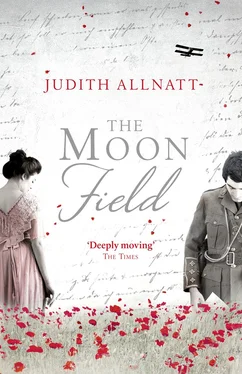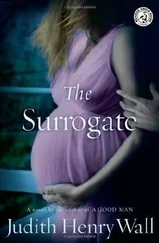‘Thank you, I’m very comfortable,’ Violet said, and then felt confused all over again as she realised that she should really be protesting that she must go.
Edmund said, ‘I see you favour the classics. Do you read the newer works as well? Forster? H. G. Wells? I can recommend Wells; he has a knack of warning us of where our current follies may lead us.’
‘I prefer Forster,’ she said, considering. ‘Wells’s view of the future is a little too bleak for my taste.’
‘We have the latest Forster somewhere; I’ll look it out for you. Have you been enjoying your stay so far? I hope Elizabeth has been looking after you and showing you around?’ Edmund tried to make this beautiful girl with the serious face feel more at ease.
‘Oh, we’ve had the most marvellous time. We went to see La Traviata and we had a wonderful picnic by the sea at Cockermouth with your father and mother and some of Elizabeth’s friends, and the cousins of course …’
‘They’re a jolly lot, aren’t they? We usually see a fair bit of them in the summer. Are you able to stay for long?’
‘A month, I hope, as long as my mother keeps well and can spare me from home.’
‘Well, we must make the most of your stay,’ Edmund said sympathetically, remembering what Elizabeth had told him of Violet’s circumstances. ‘What do you like to do the most?’
Violet told him about her photography and he listened carefully, asking her questions about shutter speeds and coloured filters, and suggesting places of interest locally where they could picnic and she could take some photographs. The conversation moved easily along as he told her of his recent studies at Cambridge and how much he had enjoyed the Officers’ Training Corps with its outdoor life of riding, camping and shooting. He told her that he was applying for a commission and hoped that his uncle, who was in the local regiment, would be able to arrange something for him. Ideally, he said, he would have liked a cavalry commission but he would have to take what his uncle could get for him and the chances were that he would end up in the infantry. ‘Foot-slogger more likely than donkey-walloper,’ he said, making her laugh, which drew from him a broad smile in return.
As Violet began to ask him more, she heard someone approaching the room and stopped abruptly. A housemaid, holding a pile of tablecloths and napkins, stood uncertainly in the doorway looking from one of them to the other. ‘Sorry, sir,’ she said to Edmund, ‘Cook said I was to lay for afternoon tea in here, sir, so’s we could open the French windows and have the draught.’
Violet, suddenly aware of how odd this must look: a lady visitor, unchaperoned, sitting knee to knee with the young gentleman of the house, got quickly to her feet.
Edmund stood too, saying, ‘Ah, yes, of course, Dolly. Miss Walter has just stepped in to find a book and I can see that I’m going to be in your way.’ He gave the girl a winning smile and she bobbed a curtsey. He turned back to Violet with a mischievous look in his eye and said, ‘I hope you’ll enjoy Mr Scott’s Ivanhoe , Miss Walter.’
‘Thank you. I’m sure I shall,’ Violet returned with equal formality and left the room. Behind her, she heard Edmund offering to open the French doors for Dolly, saying that they were rather stiff for her to manage. He engaged her in friendly conversation, distracting her with questions about the health of all below stairs and whether there had been any changes while he had been away.
Violet retired to her room and sat at the window with the book open before her. She had to admit herself charmed. She found herself recounting every step of their unconventional meeting and a strange sensation came over her once more as she thought of him helping her down from the steps and of his touch as he tucked the cushion behind her as carefully as if she were porcelain. She was not used to such attention, such cherishing, and certainly not to the way Edmund had made it so easy and natural to talk about herself. When Elizabeth put her head around her door an hour later to tell her that tea was served, she found that she had read two chapters of Ivanhoe without taking in a single word.
Entering the library once more, now freshened by a breeze from the garden, which sweetened the room with the scent of honeysuckle and fluttered the corners of the tablecloths, she was met by the sight of Mr and Mrs Lyne, Elizabeth, Edmund and three other houseguests. The party was assembled next to tea tables laden with sandwiches, ginger cake and a pale blue and gold tea service, while Dolly attended to a large urn on a side table.
‘Ah, Violet,’ Mrs Lyne said as the gentlemen rose, ‘let me introduce my son, Edmund.’
Violet, taken by surprise, almost said, ‘Thank you but we’ve already met.’ She bit back the words as they formed in her mind and hesitated, casting around desperately for the phrase that she needed.
Edmund, now buttoned into waistcoat and jacket, stepped quickly forward, saying with a deadpan expression, ‘Miss Walter, I’m so very pleased to meet you,’ and shook her hand, while Dolly looked round sharply from the tea urn with an expression that clearly said, ‘Whatever next?’
Violet subsided gratefully into her seat and Elizabeth began to tell her that she still felt a little muzzy and wondered about bridge tonight rather than an excursion. Edmund caught her eye over Elizabeth’s head and raised his eyebrows, a small smile at the corner of his mouth. As she asked distractedly for Elizabeth to repeat herself, she couldn’t help but smile back and in the moment’s complicity, she knew that her heart was lost.
Over the following weeks, Edmund joined Violet and Elizabeth in their outings with cousins and friends, Mrs Lyne accepting their plans as long as the young people were in a large group, thereby playing chaperone to each other.
‘Mother goes on the principle of “safety in numbers”.’ Elizabeth said, drawing up yet another long list of guests to join them for a country walk and picnic. Violet had noticed that however much the list varied, one name, Titus Emory, was always included, and that Elizabeth and he would often conspire to sit next to each other when dining or to share a boat when on the river. Far from feeling abandoned by her friend, Violet rejoiced in the opportunities it gave her to talk relatively privately with Edmund. They had become easy in each other’s company at home, as the family played cards together or entertained one another at the piano in the evenings; but the conversation then was light and general and Violet longed for the more personal discussions that she and Edmund shared when they could. They had exchanged opinions on music and books, Edmund playing her Chopin’s nocturnes and lending her his well-thumbed copy of poems by Yeats, which she loved and discussed with him at length. They had moved through personal anecdotes about school and university to confidences on deeper matters. Edmund told her of his belief that the old order must change, and his interest in the law as an instrument of reform to deal with working-class poverty, before social turmoil should get out of hand. Violet confided her worry about her mother and her frustration at being powerless to use her education or to affect anything beyond her own home.
For the latest outing, Elizabeth had invited a mixed group of ten and decided that they should motor out into the countryside. Violet, hopeful of some good views, took her camera with her. After parking and walking half a mile, the men carrying the wicker hampers and the ladies the rugs, they settled on a spot under an ash tree overlooking pasture, with a small stream leading into woods and in the distance the glitter of the sea. After picnicking, some of the party wanted to walk further and some to simply loll and enjoy the view. Elizabeth and Titus stayed behind for a few minutes and then strolled down to the stream; Violet and Edmund sat on, chatting, surrounded by rumpled rugs and tablecloths strewn with spirit lamp and kettle, hard-boiled eggs and Dundee cake.
Читать дальше












